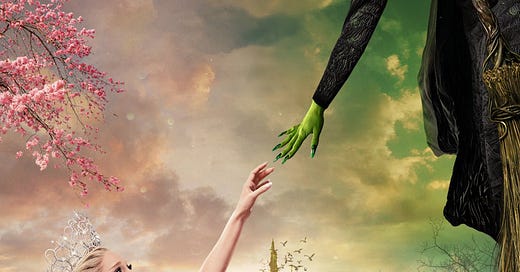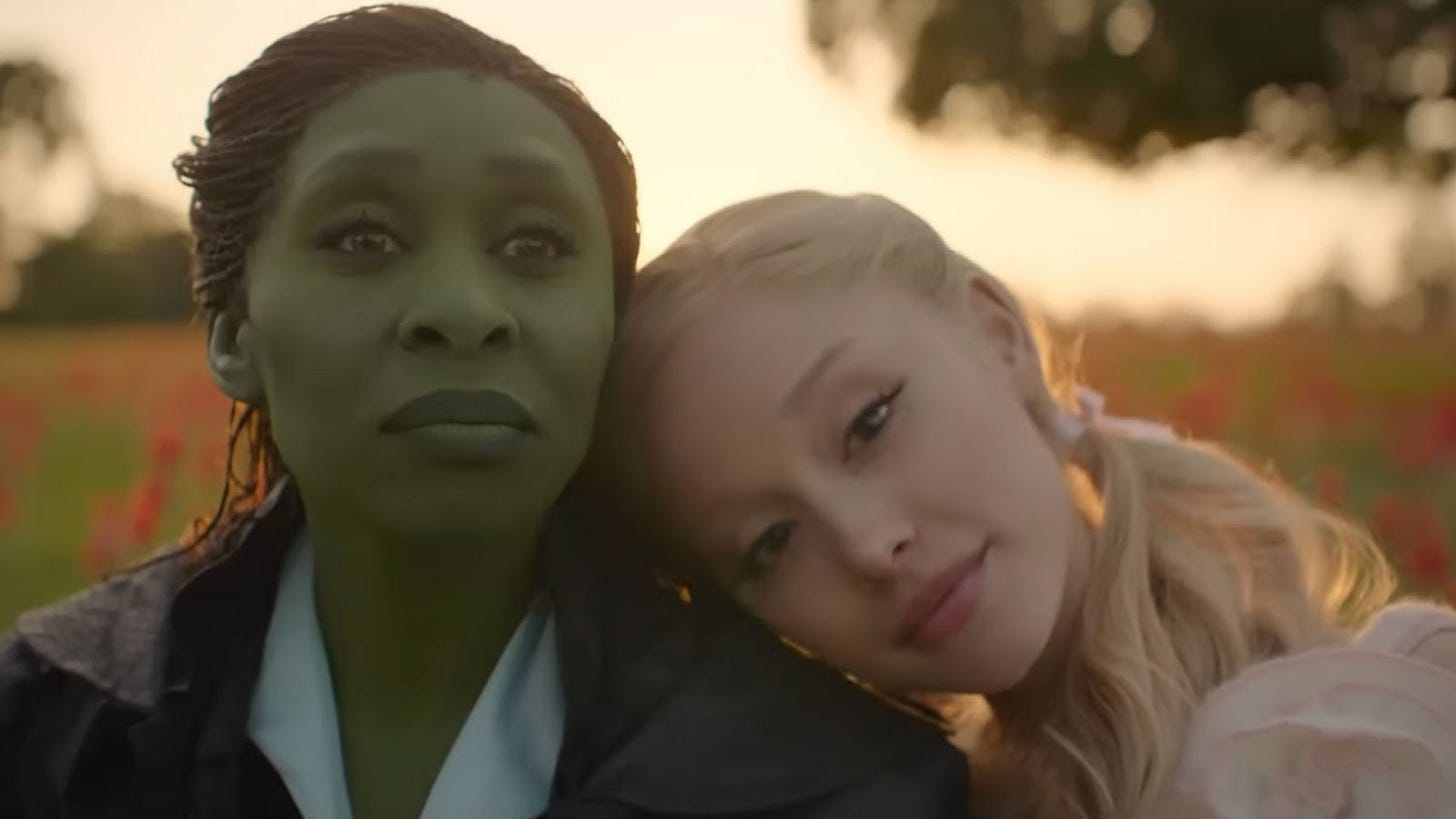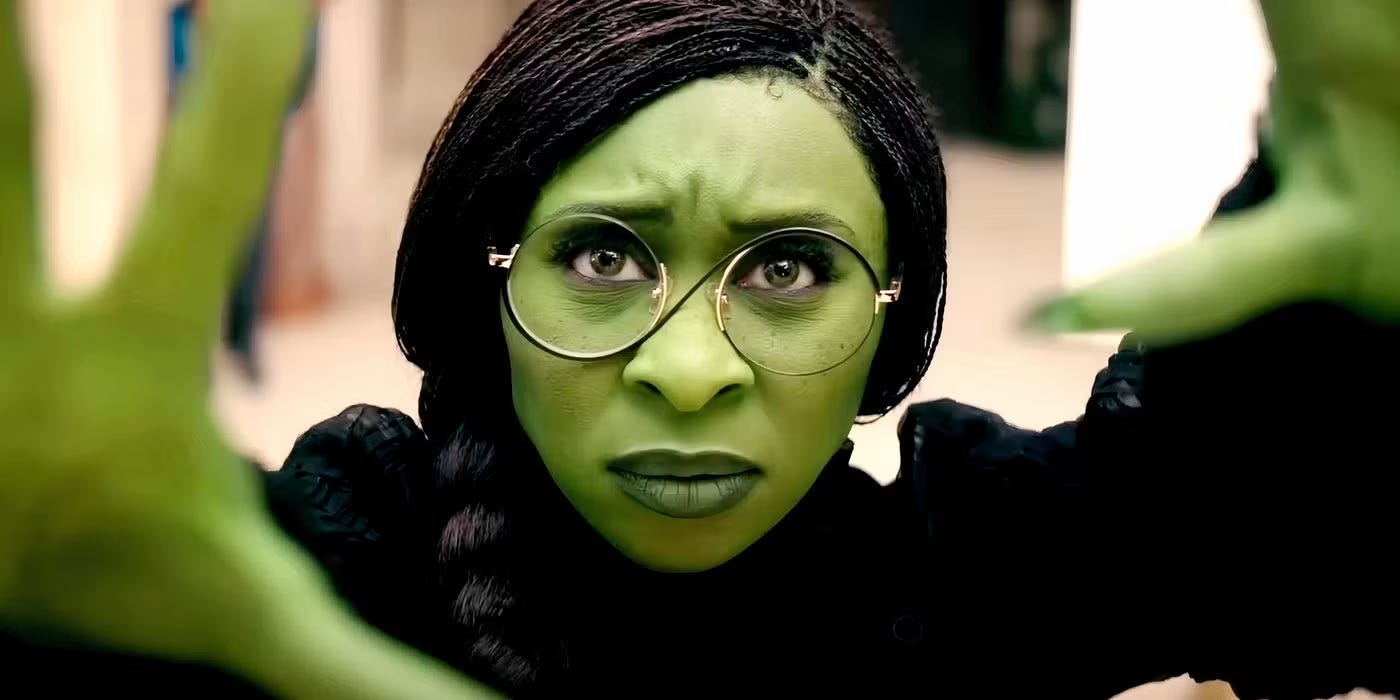The Yearning Rating: ✰✰✰✰½
Romance ✰✰✰
Sex ✰
Storytelling ✰✰✰✰
Performance ✰✰✰✰½
Yearning ✰✰✰✰✰
We’re backkkkkkk! After a month-long hiatus, we’re so excited to be flying into your inboxes with a joint review of Wicked. We tried to book Cynthia and Ariana while they were on their infamous press tour, but even though the tour may have seemed…unlimited, it did in fact have limitations (a chat with The Yearning being one of them). So we did the next best thing…and interviewed each other! We hope you enjoy ♥
Wicked Histories
Ali: Are you ready to hold space for the lyrics of “Defying Gravity”?
Meg: Yes, I am. Tell me about what Wicked means to you?
Ali: I first saw Wicked when I was 10 years old. My mom took me to New York to see it on Halloween. It was spooky. And the show, when I saw it, still had Idina Menzel in it.
Meg: [is impressed]
Ali: Yeah, it was huge. A fun fact about that trip was that there was some sort of Halloween parade that night, and we kind of got caught up in it, and we spent a lot of time walking with this group of gay men who were dressed up as Hooters waitresses. That was really fun for ten-year-old me. But Wicked was the first show I saw on Broadway, and it definitely gave me the bug. I remember taking my Playbill and cutting off the front page—which I would never do now—and modge podging it to the composition notebook that I used at school. So I definitely have a soft spot for Wicked. It was my first, you know?
Meg: I didn't see Wicked until I was a senior in high school, but I had loved it for a long time, because my babysitter would play musical soundtracks in her car while she was driving us to our after school activities. I memorized the entire soundtrack to Wicked without ever having seen it. I knew all the music backward and forwards. For a long time, I just constructed my own story out of what I knew from the songs, and then my parents bought me the novel, which I read and really enjoyed. They finally took my sister and I to see it in high school, because they were like, “Huh, you guys won't shut up about this”. And it was amazing. It was just a huge part of my tween- and teenhood. And it feels very special and nurturing to revisit in these difficult times. So it's been nice.
Ali: Yeah, it's interesting, because I feel like I loved Wicked so much as a kid, and then I think I just kind of grew out of it. I haven't really revisited it since high school. I let it go from my mind for the last 10 years, so coming back to it as an adult in this new way was so interesting. I had forgotten how much I loved it. When I went to the theater to see it I was excited, but I don't think I went into it with that sense of “wow!” that so many people had. Obviously, once I was seated and the music started, it all came back to me.
Meg: That's how I feel, too. To come back to it after 10 or so years and re-familiarize yourself with the story, and also let yourself escape into those same feelings of being a zealous theater kid was really nice. I think before the movie came out, a lot of people were saying, “Oh, it's gonna be bad.” And I was definitely prepared for it to be bad, but naysayers seemed to think it would be bad because they think the stage musical is bad. I don't know about you, but I was like, did I miss that people felt that way? Because I never felt that way.
Ali: I feel like it's one of those things where, over time, something becomes oversaturated and therefore overrated. You know what I mean? I do think that Wicked had fallen into a–for lack of a better word—touristy space where it’s no longer fun or cool. I think any musical that's been on Broadway for 20+ years starts to get a reputation of being tired.
Meg: It’s the Chicago effect.
Ali: The YouTube compilations of all the different Elphabas doing the “Defying Gravity” run are all like, hours long, and it’s become a joke. But honestly, I think that could have worked in the movie's favor. People were ready for someone to come in and do something different with it.
Meg: I agree, it breathed fresh life into this narrative world. And I think they did a good job with incorporating source material from the novel that the stage musical leaves out.
A star is born!
Ali: Okay, I feel like I need to address some controversial comments I made before Wicked came out.
Meg: Go on…
Ali: I joked that the movie took so long to make because they needed to give Ariana Grande acting lessons. But listen! I am an ardent Ari fan, and if you’ve been following her career the way I have for YEARS, you know that her acting was one million times better in Wicked than it’s ever been. I mean, am I the only one who remembers her turn as Penny Pingleton in the live recording of Hairspray! on NBC? Not good!
Meg: Okay, yes—and I can verify what you're saying. I watched an interview with her where she said she first heard about the possibility of the Wicked movie even before [Director] John Chu was attached. It was early. She was on the Sweetener tour when she found out about the possibility of auditioning, and she said to her team, “Guys, I will do whatever it takes to be in this movie. If we need to pull the plug on this tour, we will.” She said it didn’t matter that an audition date hadn’t been set yet, she wanted to get into voice and acting lessons right then. I think she trained for a year before she even auditioned?! She was so serious about it. And the acting lessons worked. She's incredible. So funny.
Ali: I got chewed out for saying that!
Meg: [holds space for Ali having been chewed out] And she's not a good dancer. But she did a great job dancing, too.
Ali: I've seen her on tour twice, okay? I am a fan. But she's not a dancer.
Meg: She is a stand-there-in-an-over-large-sweatshirt-and-boots kind of girl.
Ali: What I am trying to say is: I was so pleasantly surprised! And to be able to stand next to Cynthia Erivo, who is classically trained and so on point in every way, and hold your own?! Like, I'll admit it, I was worried and I didn't need to be. They did a fabulous job together.
Meg: I completely agree. She's not Ariana Grande in a Glinda costume. She found a way to make it her own. And I want to make a prediction here publicly–which I'm sure other people have made as well—but I do foresee this potentially leading to her returning to Broadway.
Ali: I either see her headlining a Broadway show, or I could see her pivoting to musical movies. If she gets the Oscar nomination, that would probably be the direction she'd lean into.
Meg: It would be so crazy [cool] if she gets an Oscar for this.
Gay-linda?
Ali: I feel like every headline coming out right now is: “Wicked's Always Been Gay”, or “Is Wicked Secretly Gay?”, or “Elphaba and Glinda: Gay????”. Obviously Wicked has always been a touchstone for the queer community–in that it’s so much about being othered and then finding your power and strength in your otherness. I guess I wonder, do we actually need to attach explicit queer romance to the show, in order to validate it as a queer narrative?
Meg: Also, there is queerness running through it, in that the author of the original book is gay and the story building style feels inherently queer. And centering a character like Elphaba, isolated both for what makes her different and her value system, is a very queer perspective. Do you feel like it's an exaggeration to say the plot of Wicked is a representation of fascism?
Ali: No, I think that's clear. It's about a puppet leader who has to create a common enemy to retain power.
Meg: Yeah, exactly. And so, when I look at it that way, as a whole–the characters, their friendship, the political context–is it reductive of the inherent queerness of the story, and of their connection, and of the intimacy between them to be like, “Glinda wants Elphaba!”
Ali: I think it’s only reductive if you’re not also highlighting the other queer aspects of the show. Basically, it's not diluting anything—but it's also not really the point.
Meg: I completely agree. When I take a step back, I wonder…are these characters more independently queer than they are as a unit? Elphaba is the obvious representation of being othered; cast aside because of this part of you that’s different. But that difference is, in fact, beautiful and special in its own way. And finding a way to harness and celebrate it is a version the familiar coming out narrative we all know. And then, Glinda—Glinda is yearning. She’s longing for both connection with and validation from Elphaba. She cares what Elphaba thinks of her; like whether or not Elphaba believes in her ability to produce magic or to lead Oz. All of that meant more to Glinda than anything Fiero ever said—I feel like that's queer as well.
Ali: Exactly. Glinda is yearning for a kind of intimacy with Elphaba, even if it’s not definitively romantic. And Elphaba is yearning for independence and self-actualization, which is also queer. Even if we don't prescribe these definitive terms, like “crush” or “romance”, there's still that queer element to it.
Meg: And yet they do still have a profound connection.
Ali: I know we're only talking about Part 1 here, but we do know what the whole story is. Do you think that this idea that’s being really celebrated right now—that Elphaba is finding her beauty and “defying gravity”—is complicated by the second part of the story? Because she does become bitter and withdrawn. I think what we’re seeing reflected in these headlines is an almost simplified view of queerness. A view that suggests it’s always this defiant celebration–which is great, because I think we really need that right now. But I'm also kind of excited for the way that people might see a more complicated queer story in Part 2. One where it's not always so easy to see the beauty in what makes us different. Sometimes society makes that really hard. I think that reality needs to be interrogated as well.
Meg: I completely agree with you. It's validating to see media that reflects a nuanced queer experience. We'll come back to this in a year. Stay tuned!
Enemies-to-Lovers
Meg: Not to go back to the whole “Elphaba, Glinda: Gay??” take, but if we are going to talk about sexual tension, we should talk about, “What is this Feeling?” If I was going to make an argument for them being, you know, quote, unquote, slap a label on it, in love, I would cite this song. The lyrics of the song are so explicitly crush. “What is this feeling so sudden and new? I felt the moment I laid eyes on you? My pulse is rushing. My head is reeling.”
Ali: My face is flushing!
Meg: I mean that's so…hot and heavy.
Ali: I have a funny story about that song. When I was ten or eleven, I used to do the very classic theater kid thing where I’d perform for family friends who were over for dinner. And one night my friend and I went upstairs and practiced “What Is This Feeling?” the whole night. When we finally came downstairs to perform it for our parents, we got through the first, like, sixteen bars, before her brother interrupted us by shouting, “Are you guys GAY?” Obviously at the time I was mortified, but also…he’s not wrong.
Meg: He knew!
Ali: Exactly. The song has always been gay.
Meg: For what it’s worth, Wicked is also formulated like a classic enemies-to-lovers story…there are countless musicals where the leads are men and women who start out hating each other—
Ali: Loathing each other?
Meg: Loathing each other! They start out hating each other and, through forced proximity or shared struggles or whatever, they fall in love by the end of the show. I’m thinking about Thoroughly Modern Millie…
Ali: Kiss Me Kate.
Meg: Guys and Dolls, too! And then these characters will have an intimate, soul-searching duet where they look deeply into each other's eyes and admit their feelings for each other. Elphaba and Glinda are our two main characters. And in “What Is This Feeling?” they’re basically saying everything but—and then, ha ha, the gag is that they hate each other. But there’s no denying the love in a song like, “For Good”.
Ali: That’s true!
Cameos
Ali: I was genuinely surprised.
Meg: I know! I managed to not spoil it for myself. Nia (Gibson, friend of The Yearning) and I fully grabbed each other, we just couldn't believe it. They seemed like they had a great time.
Ali: It was nice to see Broadway stars being iconified in that way.
Meg: Agreed. It felt like the movie adaptation was ticking another box; another way that they are thoughtfully honoring all of the source material that this comes from, while still making something fresh.
These are a few of our favorite songs…
Ali: So to wrap it up, let's talk about our favorite songs.
Meg: I mean, I think “The Wizard and I” is my favorite Act I song. It's hopeful but vulnerable. It's beautiful. I used to sing it in voice lessons all the time. I love it.
Ali: Mine's pretty lame. I just really love “Dancing Through Life”, like the entirety of it. It just feels so grand to me. And so musical theater. To have the whole company involved, a big dance number, but you're also moving the plot forward. I loved seeing that come to life.













YASSSS been waiting for this one
the tagline is *chef's kiss*